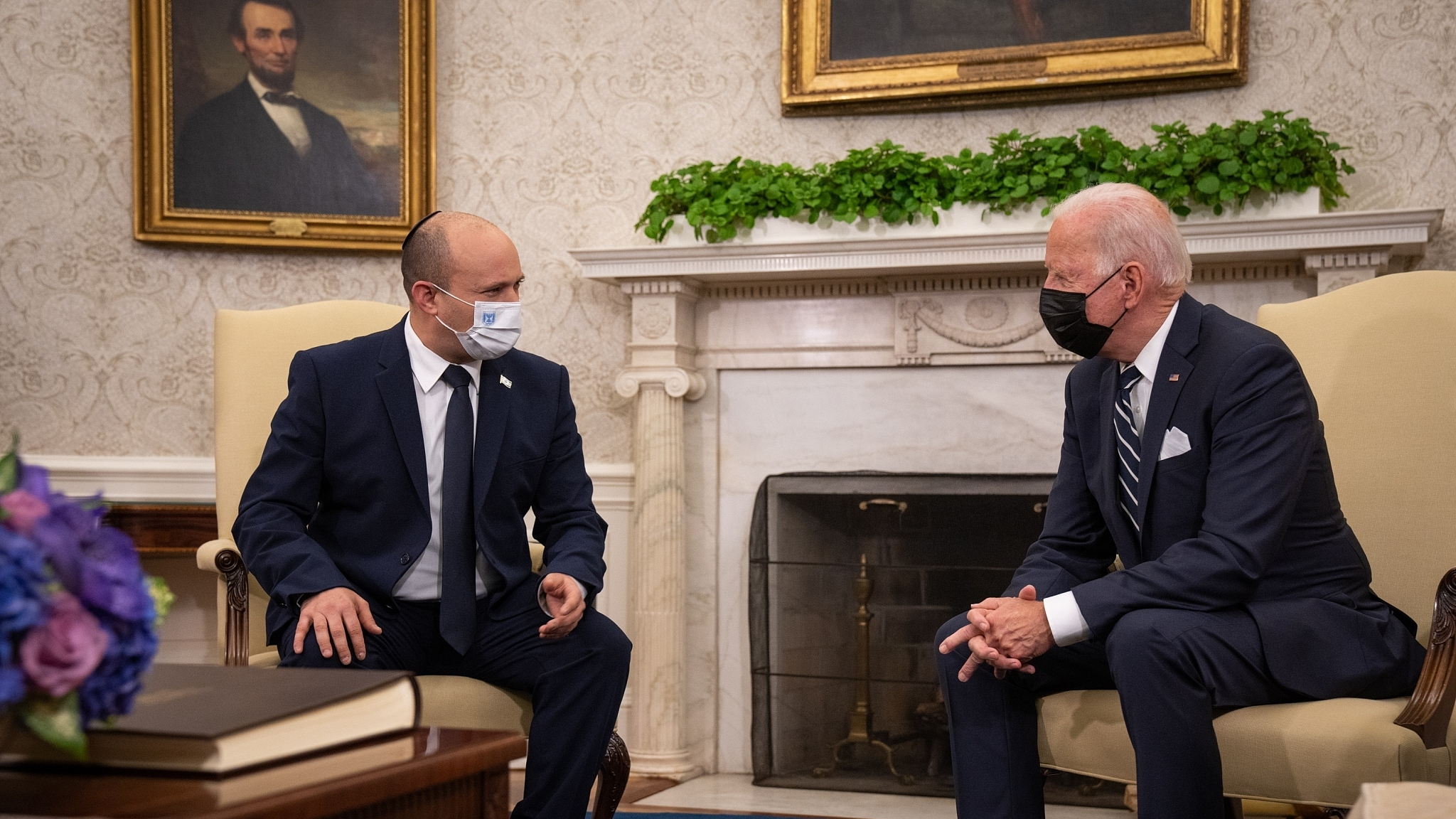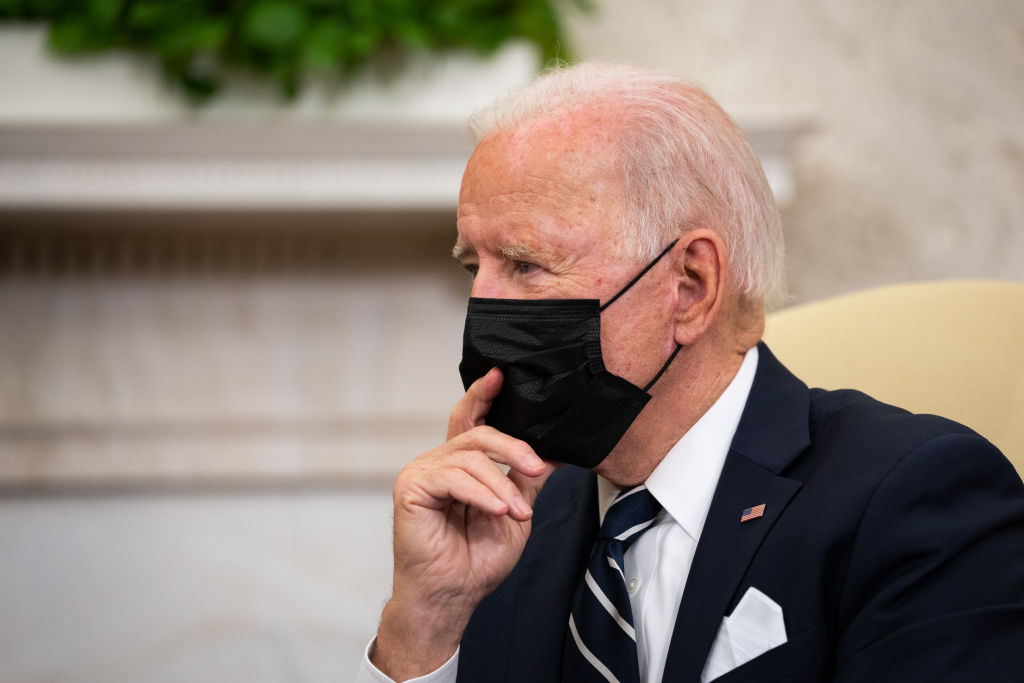
Israeli Prime Minister Naftali Bennett speaks during his meeting with U.S. President Joe Biden in the Oval Office of the White House in Washington, D.C., U.S., August 27, 2021. /VCG
Israeli Prime Minister Naftali Bennett speaks during his meeting with U.S. President Joe Biden in the Oval Office of the White House in Washington, D.C., U.S., August 27, 2021. /VCG
Editor's note: Bradley Blankenship is a Prague-based American journalist, political analyst and freelance reporter. The article reflects the author's opinions and not necessarily the views of CGTN.
After a delay due to the deadly bombing in Kabul on August 26, U.S. President Joe Biden and Israeli Prime Minister Naftali Bennett met the next day in Washington in what was predicted to be the beginning of a "reset" between the two close allies.
According to Biden, the summit between the two was meant to show "an unshakable partnership between our two nations" at a time when U.S. foreign policy is drawing heavy criticism. Whether or not there will actually be a reset between the two sides – meaning, a return to lockstep foreign policy coordination – is doubtful. But to be sure, Biden and Bennett both have a deep interest in re-establishing order.
For Bennett, this means getting out from under the shadow of former Prime Minister Benjamin Netanyahu. The former Israeli leader was a divisive figure, not just for Israeli politics but also in the United States where he often exploited partisan divides in the country for his own political agenda.
During the tenure of former U.S. President Barack Obama, who Biden served under as vice president, Netanyahu seriously breached diplomatic protocols by allying with congressional Republicans (at that time, the opposition party) in an attempt to torch the Iran nuclear deal and undermine the administration's foreign policy. He even gave a blistering speech before Congress without an invitation by the White House on the subject, which then-Vice President Biden skipped.
As a unity leader, it's clear that Bennett will not follow suit and breach diplomatic and political protocols to advance his agenda. This, i.e. normalcy, is essentially his entire mandate as prime minister with a broad yet tentative coalition keeping him afloat. But, to be clear, his government does have an agenda and it is quite opposed to the official positions of the Biden administration.
Biden also has an interest in returning to orderly relations with Israel. That's because his approval rating fell to an average low of 47 percent, thanks largely to the fallout of the country's withdrawal from Afghanistan, in addition to a resurgence of COVID-19 infections fueled by the Delta variant. In order to compensate for this situation, Biden needs to show confidence on the foreign policy front through mutual reassurance with a key ally in Israel.

U.S. President Joe Biden listens as Naftali Bennett, Israel's Prime Minister, not pictured, speaks in the Oval Office of the White House in Washington, D.C., U.S., August 27, 2021. /Getty
U.S. President Joe Biden listens as Naftali Bennett, Israel's Prime Minister, not pictured, speaks in the Oval Office of the White House in Washington, D.C., U.S., August 27, 2021. /Getty
For Biden, the most important thing is to work with his Israeli counterpart to keep the situation in the Middle East at least chilled for now as his party prepares for the 2022 midterm elections. These elections will be extraordinarily important for the Biden agenda since Republican control of either chamber of Congress would mean his plans will be dead on arrival. Because of that, Biden can't afford another embarrassment on, for example, the issue of Iran or Israeli settlements.
There's some precedent to draw on here since Biden's first major foreign policy challenge as president actually came from the Israel-Palestine conflict when in May of this year conflict broke out once again, leaving hundreds, mostly Palestinians, dead.
He was criticized by every side, but most notably from members of his own party on the floor of Congress – something which has never happened before – for staying hush on the issue, which was essentially a tacit endorsement of Israel's hostilities. This marked a serious turning point on this issue, and it's clear that the status quo will never return.
This irreversible shift then raises serious questions about the possibility of a full "reset" between the U.S. and Israel because a significant (and continually growing) sector of the U.S. public – as well as politicians – are fed up with Israel's actions.
For his part, Prime Minister Bennett has not indicated that he would seriously change his country's foreign policy direction and if anything maintains the same position as his predecessor. Sure, as it pertains to the U.S., his government will take a softer line, but on fundamental foreign policy issues his government is vowing a hardline stance.
He even told the New York Times before the summit with Biden that he would "oppose American-led attempts to reinstate a lapsed nuclear agreement with Iran" and "would expand West Bank settlements that Mr. Biden opposes." Obviously this would pose a serious dilemma for the Biden administration should Israel instigate flare-ups in Gaza, the West Bank or with Iran – and the possibility of at least one of these outcomes seems not just likely but inevitable.
So, for Biden and Bennett, the question is not if but when divergences between Washington and Tel Aviv will happen yet again. This raises serious doubt about the future relations between the two sides, barring any serious foreign policy shift on the part of Israel.
(If you want to contribute and have specific expertise, please contact us at opinions@cgtn.com.)

